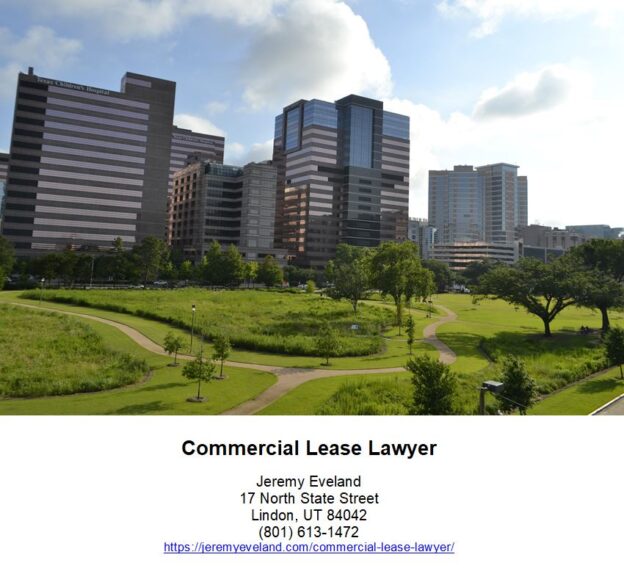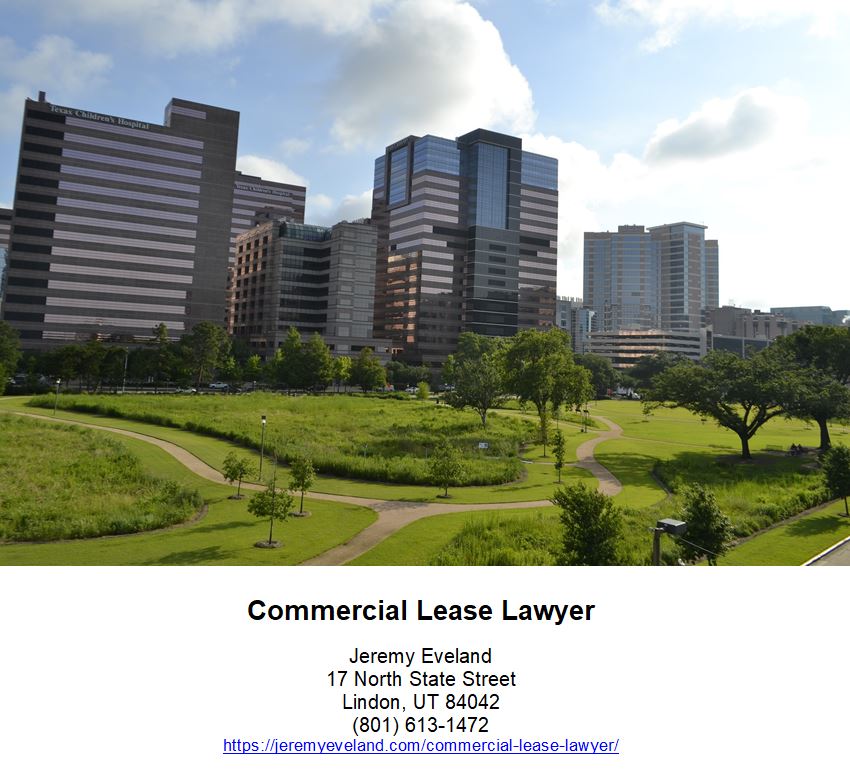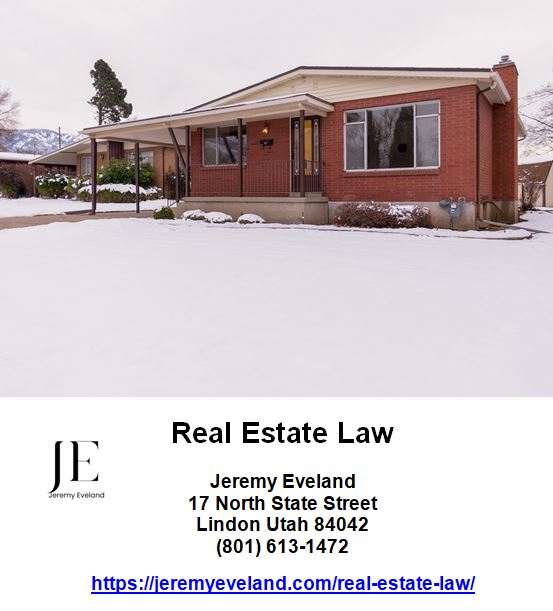Considering whether to buy or lease commercial real estate can be a crucial decision for any business owner. The choice between these two options can have significant implications for your company’s financial health and long-term growth. In this article, we will explore the merits of buying and leasing commercial properties, providing you with valuable insights to determine which option is best suited for your unique business needs. By the end, you’ll not only have a clearer understanding of the advantages and disadvantages of both choices, but you’ll also have a strong desire to seek the expertise of commercial real estate lawyer Jeremy Eveland for a consultation tailored to your specific circumstances.
Pros and Cons of Buying Commercial Real Estate
When it comes to choosing a commercial real estate option, there are several factors to consider. Buying commercial real estate may offer certain advantages, while leasing commercial real estate has its own set of benefits. In this article, we will explore the pros and cons of both options to help you make an informed decision.
Advantages of Buying Commercial Real Estate
1. Equity and Appreciation Potential
One of the major advantages of buying commercial real estate is the potential for building equity and appreciation. By owning the property, you have the opportunity to benefit from any increase in its value over time. As your equity grows, you can leverage it for additional investments or for financing future business endeavors.
2. Control and Flexibility
When you buy commercial real estate, you have complete control over the property. This control allows you to make modifications, renovations, or customizations based on your specific business needs. You also have the flexibility to use the property as you see fit, without the constraints of a lease agreement.
3. Tax Benefits
Buying commercial real estate can provide tax benefits for business owners. Tax deductions can be claimed for mortgage interest, property taxes, depreciation, and other related expenses. These deductions can significantly reduce your taxable income and potentially result in substantial savings.
Disadvantages of Buying Commercial Real Estate
1. High Initial Investment
One of the main disadvantages of buying commercial real estate is the high initial investment required. Purchasing a commercial property often involves a significant down payment and closing costs. This can be a barrier for businesses with limited capital or those looking to allocate resources to other areas of their operations.
2. Maintenance and Repair Costs
As the owner of a commercial property, you are responsible for its maintenance and repair costs. This includes regular upkeep, renovations, and addressing any unexpected issues that may arise. These expenses can be significant and should be factored into your budget and financial planning.
3. Limited Flexibility
While owning a commercial property offers control and flexibility, it may also come with certain limitations. If your business needs change or you want to relocate, selling the property can be time-consuming and may not guarantee a quick return on investment. This lack of flexibility can be a disadvantage for businesses with evolving needs or those in rapidly changing industries.
4. Market Risk
The value of commercial real estate is closely tied to market conditions. Economic fluctuations, changes in local demographics, and shifts in supply and demand can impact the value of your property. This market risk can be a concern for businesses relying on the property as a long-term investment or for those in industries with unpredictable futures.
Pros and Cons of Leasing Commercial Real Estate
Leasing commercial real estate offers a different set of advantages and disadvantages compared to buying. Let’s explore these factors in more detail.
Advantages of Leasing Commercial Real Estate
1. Lower Initial Costs
One of the major advantages of leasing commercial real estate is the lower initial costs compared to buying. Leasing typically requires a smaller upfront investment, as you are not responsible for a down payment or closing costs. This can free up capital for other business needs or allow you to enter the market more quickly.
2. Flexibility and Scalability
Leasing provides businesses with the flexibility to adapt and scale their operations as needed. Whether you need to expand to accommodate growth or downsize due to changing market conditions, leasing allows you to easily adjust your space requirements. This flexibility can be particularly valuable for startups or businesses with uncertain needs.
3. No Maintenance Responsibilities
When you lease a commercial property, the landlord is typically responsible for its maintenance and repair costs. This can be a significant advantage, as it relieves you from the burden of allocating resources and time towards upkeep. Additionally, leasing may provide access to shared amenities and services, further reducing your maintenance responsibilities.
Disadvantages of Leasing Commercial Real Estate
1. No Equity Building
One of the main disadvantages of leasing commercial real estate is the absence of equity building. Unlike buying, leasing does not provide the opportunity to build ownership in a property or benefit from its appreciation. As a tenant, you are essentially paying for the right to use the space without any long-term financial gain.
2. Rent Increases
Lease agreements typically have provisions for periodic rent increases. While these increases may be manageable initially, they can add up over time and potentially become a significant expense for your business. It is important to carefully review and negotiate lease terms to mitigate the impact of future rent hikes.
3. Limited Customization
As a tenant, you may have limited control over the customization of the leased space. While some landlords may allow modifications, there are often restrictions in place. This lack of customization options can impact the efficiency and branding of your business, as well as limit your ability to create a unique and tailored environment.
4. Possible Restrictions
Lease agreements may come with certain restrictions imposed by the landlord or property management. These restrictions can include limitations on signage, operating hours, subleasing, and other aspects that may affect your business operations. It is crucial to carefully review the terms of the lease to ensure they align with your business needs and goals.
Considerations for Buying Commercial Real Estate
When considering buying commercial real estate, there are several factors to evaluate. Let’s delve into these considerations to help you make an informed decision.
1. Financial Preparedness
Before buying commercial real estate, it is vital to assess your financial preparedness. Evaluate your available capital, borrowing capacity, and financial projections to determine if purchasing a property aligns with your business goals and financial stability. Consulting with a financial advisor can provide valuable insights into the potential risks and rewards of buying commercial real estate.
2. Long-term Goals
Consider your long-term goals and strategic vision for your business. Owning commercial real estate can provide stability and the potential for long-term growth. Assess whether your business requires a permanent location or if flexibility and scalability are more important. Understanding your long-term goals will help guide your decision-making process.

3. Location and Market Analysis
Location plays a crucial role in the success of any business. Conduct a thorough analysis of the location you are considering for your commercial property. Examine factors such as demographics, accessibility, competition, and market trends. Understanding the local market dynamics will help determine if it is conducive to your business growth and profitability.
4. Property Inspection and Due Diligence
Before finalizing a commercial real estate purchase, conduct a comprehensive property inspection and due diligence. Engage the services of a qualified inspector or engineer to assess the condition of the property and identify any potential issues. Additionally, review all relevant documents such as surveys, permits, leases, and financial statements to ensure there are no hidden liabilities or encumbrances affecting the property.
5. Financing Options
Explore different financing options available for purchasing commercial real estate. This may include traditional bank loans, Small Business Administration (SBA) loans, or private lenders. Research and compare interest rates, terms, and requirements to find the most suitable financing solution for your business. Consulting with a commercial real estate lawyer can provide expert guidance throughout the financing process.
Considerations for Leasing Commercial Real Estate
For businesses considering leasing commercial real estate, here are some important considerations to keep in mind.
1. Budget and Cash Flow
Evaluate your budget and cash flow to determine how much you can afford to allocate towards lease payments. Consider not only the monthly rent but also any additional costs such as utilities, maintenance fees, and taxes. It is crucial to ensure that leasing the space does not strain your financial resources or negatively impact your business’s ability to meet its other financial obligations.
2. Lease Terms and Flexibility
Review the lease terms carefully before committing to a commercial property. Pay attention to aspects such as lease duration, renewal options, rent escalation clauses, and termination provisions. Negotiate terms that provide flexibility and align with your business needs. Engaging a commercial real estate lawyer can help ensure that the lease terms are fair and favorable to your interests.
3. Location and Accessibility
Consider the location of the leased property and its accessibility for your target market and employees. Evaluate factors such as proximity to transportation hubs, parking availability, and the presence of nearby amenities. Choosing a location that is convenient for your customers and employees can contribute to the success and productivity of your business.
4. Tenant Improvement Allowance
When leasing commercial real estate, inquire about any tenant improvement allowance (TIA) offered by the landlord. A TIA is a contribution towards the costs of customizing or renovating the leased space to meet your specific business needs. Understanding the amount and conditions of the TIA can help you determine the feasibility of making necessary changes to the property.
5. Lease Renewal and Termination
Consider the lease renewal and termination options available to you. Assess the flexibility of the lease agreement in terms of extending the lease beyond the initial term or terminating it early if needed. Having the ability to adjust your space requirements or relocate can be crucial for businesses with changing needs or those looking to scale operations.
Financial Comparison: Buying vs. Leasing
Understanding the financial implications of buying or leasing commercial real estate is essential. Let’s compare these two options in terms of initial costs, monthly expenses, long-term investment potential, and tax implications.
1. Initial Costs
Buying commercial real estate involves a significant initial investment, including a down payment, closing costs, and any necessary renovations or improvements. Leasing, on the other hand, typically requires a smaller upfront investment, as you are not responsible for property acquisition costs.
2. Monthly Expenses
When buying commercial real estate, monthly expenses include mortgage payments, property taxes, insurance, maintenance costs, and utilities. Leasing, on the other hand, usually involves lower monthly expenses, with the landlord being responsible for property maintenance and certain other costs.
3. Long-term Investment Potential
Buying commercial real estate offers the potential for long-term investment and equity building. As the property appreciates in value, you can benefit from the increased equity, potential rental income, and the option to sell the property for a profit. Leasing does not provide the opportunity for equity building or direct financial gain from market appreciation.
4. Tax Implications
Buying commercial real estate can offer various tax benefits, such as deductions for mortgage interest, property taxes, depreciation, and other related expenses. These deductions can significantly reduce your taxable income, resulting in potential tax savings. Leasing, however, does not provide the same opportunities for tax deductions.
Legal Considerations for Buying Commercial Real Estate
When buying commercial real estate, there are several legal considerations to be aware of. Consultation with a commercial real estate lawyer can provide guidance on navigating these complex legal matters. Let’s explore some of the key legal considerations.

1. Property Purchase Agreement
The property purchase agreement is a legally binding contract that outlines the terms and conditions of the sale. It is crucial to have a comprehensive and accurately drafted agreement that protects your interests. A commercial real estate lawyer can review and negotiate the purchase agreement to ensure it aligns with your goals and safeguards your rights.
2. Zoning and Land-use Regulations
Understanding zoning and land-use regulations is essential before buying commercial real estate. Familiarize yourself with local zoning ordinances, building codes, and any restrictions that may impact your intended use of the property. A commercial real estate lawyer can assist with conducting due diligence to ensure compliance with these regulations.
3. Title Search and Insurance
Conducting a thorough title search is important to identify any potential liens, encumbrances, or disputes related to the property’s ownership. Title insurance provides protection against unforeseen issues that may arise with the property’s title. A commercial real estate lawyer can facilitate the title search process and provide guidance on obtaining title insurance.
4. Environmental Assessments
Environmental assessments are essential to identify any potential environmental liabilities associated with the property. Evaluating factors such as soil and water contamination, hazardous materials, or endangered species can help mitigate financial and legal risks. Engaging environmental consultants and working with a commercial real estate lawyer can ensure compliance with environmental regulations.
5. Financing and Mortgage Agreements
If you require financing for purchasing commercial real estate, it is crucial to carefully review and negotiate the terms of the mortgage agreement. Understanding interest rates, repayment terms, prepayment penalties, and default provisions is essential to protect your financial interests. A commercial real estate lawyer can facilitate the financing process and provide legal advice throughout.
Legal Considerations for Leasing Commercial Real Estate
Leasing commercial real estate also involves various legal considerations. Seeking guidance from a commercial real estate lawyer can help navigate these legal complexities. Let’s explore some of the key legal considerations when leasing commercial real estate.
1. Lease Agreement
The lease agreement is a legally binding contract that outlines the rights and obligations of the landlord and tenant. It is essential to carefully review and negotiate the terms of the lease agreement to protect your interests. A commercial real estate lawyer can guide you through the negotiation process and ensure that the agreement aligns with your business needs.

2. Negotiating Terms and Conditions
Negotiating lease terms and conditions is a critical aspect of securing a favorable lease agreement. From rent escalation clauses to maintenance responsibilities, understanding and carefully negotiating these terms can impact your business’s financial stability and operations. A commercial real estate lawyer can provide valuable insights and advocate for your interests during lease negotiations.
3. Liability and Insurance
Understanding liability and insurance obligations is important when leasing commercial real estate. Determine who is responsible for maintaining liability insurance and what type of coverage is required. Additionally, review whether the lease requires you to indemnify the landlord in case of any legal claims. A commercial real estate lawyer can assess the lease terms and ensure they align with your risk tolerance and insurance needs.
4. Dispute Resolution
When entering into a lease agreement, it is crucial to include provisions for dispute resolution. Consider whether mediation, arbitration, or litigation will be the preferred method for resolving any potential conflicts between the landlord and tenant. A commercial real estate lawyer can provide guidance on the appropriate dispute resolution mechanisms based on your specific circumstances.
5. Compliance with Regulations
Ensure compliance with applicable regulations when leasing commercial real estate. This includes adhering to zoning ordinances, building codes, health and safety regulations, accessibility standards, and any other legal requirements. Consulting with a commercial real estate lawyer can help you understand and navigate the regulatory landscape to avoid legal complications.
When Buying Commercial Real Estate Makes Sense
While both buying and leasing have their own advantages, there are specific scenarios where buying commercial real estate may be the preferable option. Consider the following factors when evaluating whether buying commercial real estate makes sense for your business.
1. Established and Stable Business
If your business is well-established and shows stability, buying commercial real estate can provide long-term stability and potential financial gains. It allows you to establish a physical presence and build equity in a property that aligns with your specific business needs.
2. Long-term Growth Strategy
Buying commercial real estate can be a strategic decision for businesses with long-term growth plans. If you anticipate the need for additional space or expansion in the future, owning a property allows you to have control over your growth trajectory without the uncertainties of leasing.
3. Financial Stability
If your business has financial stability and sufficient capital, buying commercial real estate can be a worthwhile investment. It provides an opportunity for asset appreciation and potential income generation through rental income or property value appreciation.
4. Location and Market Analysis
If you have conducted a thorough location and market analysis that indicates a stable and profitable market, buying commercial real estate can be a sound decision. Owning a property in a desirable location can contribute to the success and growth of your business.
When Leasing Commercial Real Estate Makes Sense
Leasing commercial real estate is a viable option in certain circumstances. Consider the following factors when evaluating whether leasing commercial real estate is the right choice for your business.
1. New Business or Startup
For new businesses or startups, leasing commercial real estate is often a more flexible and cost-effective option. It allows you to allocate resources towards business growth and operations without the significant upfront investment required for buying.
2. Short-term or Uncertain Needs
If your business has short-term or uncertain space requirements, leasing provides flexibility to adjust as needed. Whether you anticipate growth or downsizing in the future, a lease agreement allows you to adapt without the long-term commitment of buying.
3. Limited Financial Resources
For businesses with limited financial resources, leasing is often the more feasible option. It requires a smaller upfront investment and provides access to necessary space without tying up capital in property ownership.
4. Wanting Flexibility and Scalability
Leasing commercial real estate offers businesses the freedom to be flexible and scalable. If your business’s needs are likely to change, leasing allows you to quickly adjust your space requirements without the constraints of property ownership.
Guidance from a Commercial Real Estate Lawyer
Navigating the complexities of commercial real estate transactions can be challenging. Seeking guidance from a commercial real estate lawyer can provide invaluable assistance throughout the process. Here are some ways in which a commercial real estate lawyer can help.
1. Assessing Your Needs and Goals
A commercial real estate lawyer will work closely with you to understand your business needs and goals. They will assess your situation, evaluate available options, and provide expert advice tailored to your specific circumstances. This assessment ensures that the decisions you make align with your long-term objectives.
2. Legal Review and Assistance
A commercial real estate lawyer will review all relevant legal documents, including purchase agreements, lease agreements, financing agreements, and other contracts. They will identify any potential legal risks or pitfalls and provide guidance on how to mitigate them. This legal review ensures that you fully understand your rights and obligations and are protected from any potential legal issues.
3. Negotiation and Contract Support
During negotiations, a commercial real estate lawyer can provide essential support. They will use their expertise to negotiate favorable terms and conditions on your behalf. Their knowledge of current market trends and legal requirements ensures that you enter into agreements that serve your best interests.
4. Avoiding Common Pitfalls
Commercial real estate transactions can be complex, and it is easy for businesses to fall into common pitfalls. A commercial real estate lawyer can guide you throughout the process, helping you avoid costly mistakes, legal complications, and unnecessary risks. With their assistance, you can navigate the transaction smoothly and with peace of mind.
In conclusion, both buying and leasing commercial real estate have their pros and cons. The decision ultimately depends on your specific business needs, financial situation, and long-term goals. Consulting with a commercial real estate lawyer like Jeremy Eveland can provide invaluable expertise and guidance throughout the process. Their insights can help you make an informed decision and ensure that you navigate the legal complexities involved in commercial real estate transactions. Whether you choose to buy or lease, having professional guidance will give you the confidence and peace of mind needed to move forward with your commercial real estate endeavors.


































